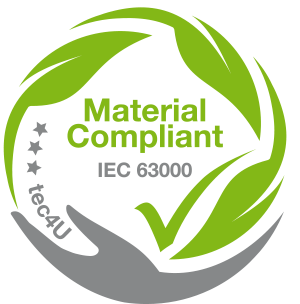Material Compliance specifications & statutory bases
Excerpt from tec4U’s requirements register
Regulation (EU) No 528/2012 of the European Parliament and of the Council of 22 May 2012 concerning the making available on the market and use of biocidal products.
The term referred to global requirements concerning supply chain due diligence obligations for importers of tin, tantalum and tungsten, their ores and gold originating from conflict-affected and high-risk areas.
Implementation of the WEEE and RoHS directives in Germany.
Implementation of the RoHS directive in Germany.
Regulation (EU) No 995/2010 of the European Parliament and of the Council of 20 October 2010 laying down the obligations of operators who place timber and timber products.
German ordinance concerning the protection from hazardous substances in occupational health and safety.
Regulation EC No. 1935/2004 defines the framework for all materials and articles intended to come into contact with food. GMP essentially describes quality assurance standards applicable to the production and inspection, with the requirements for printing inks detailed in the Annex.
HONG KONG INTERNATIONAL CONVENTION FOR THE SAFE AND ENVIRONMENTALLY SOUND RECYCLING OF SHIPS (2009)
IEC 63000 specifies the technical documentation that the manufacturer compiles in order to declare compliance with the applicable substance restrictions.
The new regulation on Medical Devices (MDR) entered into force on 25 May 2017. Noncompliance with legal material requirements may lead to serious liability risks.
Regulation (EC) No 2019/1021 of the European Parliament and of the Council of 20. June 2019 on persistent organic pollutants. European implementation of Stockholm Convention.
Safe Drinking Water and Toxic Enforcement Act of 1986. Monitored by the California Office of Environmental Health Hazard Assessment (OEHHA).
Regulation (1907/2006/EC) concerning the Registration, Evaluation and Authorization of Chemicals (effective June 1, 2007).
As a European Regulation, REACH does not have to be ratified at the national level. In addition, REACH is non-industry-specific and therefore applies equally to manufacturers and importers in every industry. Although the focus is on chemicals, the entire supply chain is affected. Everyone is required to report SVCH contents to the downstream user and to ensure that Annex XIV and XVII materials are eliminated/replaced by the deadline.
Directive 2012/19/EU on the restriction of the use of certain hazardous substances in electrical and electronic equipment (effective January 2003).
- RoHS in China: “Administrative Measure on the Control of Pollution Caused by Electronic Information Products”. (effective March 1, 2007)
- RoHS in California: “Electronic Waste Recycling Act”. This law requires the recycling of optical playback devices and prohibits certain ingredients. (effective January 1, 2007)
- ROHS in Korea: “The Act for Resource Recycling of Electrical/Electronic Products and Automobiles” contains standards for hazardous substances. (effective July 1, 2008)
- RoHS in India: “E-waste (Management and Handling) Rules 2010” mandates the environmentally sound disposal of waste electrical and electronic equipment and restricts the use of hazardous substances. (in the planning stage)
- RoHS in Japan: Under the “Law for Recycling of Specified Kinds of Home Appliances”, manufacturers and importers have an obligation to provide information on ingredients in certain electronic products.
(effective August 1, 2001) - RoHS in Turkey: “Restriction of the Use of Certain Hazardous Substances in Electrical and Electronic Equipment” contains standards for hazardous substances. (effective July 1, 2008)
With the amendment of the Waste Framework Directive (ARRL) by Regulation 2018/831/EU, ECHA was mandated to introduce a database (SCIP database) in which, according to Article 33 (1), the information shall be entered by the suppliers.
Under the Toxic Substances Control Act (TSCA) EPA evaluates potential risks from new and existing chemicals and acts to address any unreasonable risks chemicals may have on human health and the environment.
Administrative Directive 2002/96/EC on waste electrical and electronic equipment. Governs marketing, collection and environmentally responsible waste management (effective January 2003).
If you have questions please contact:

